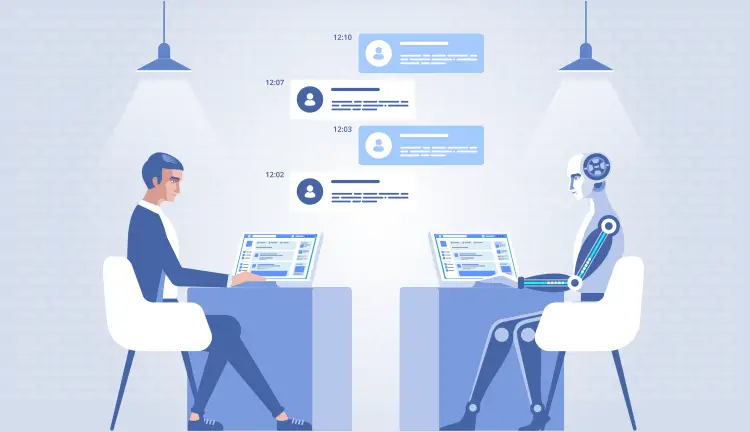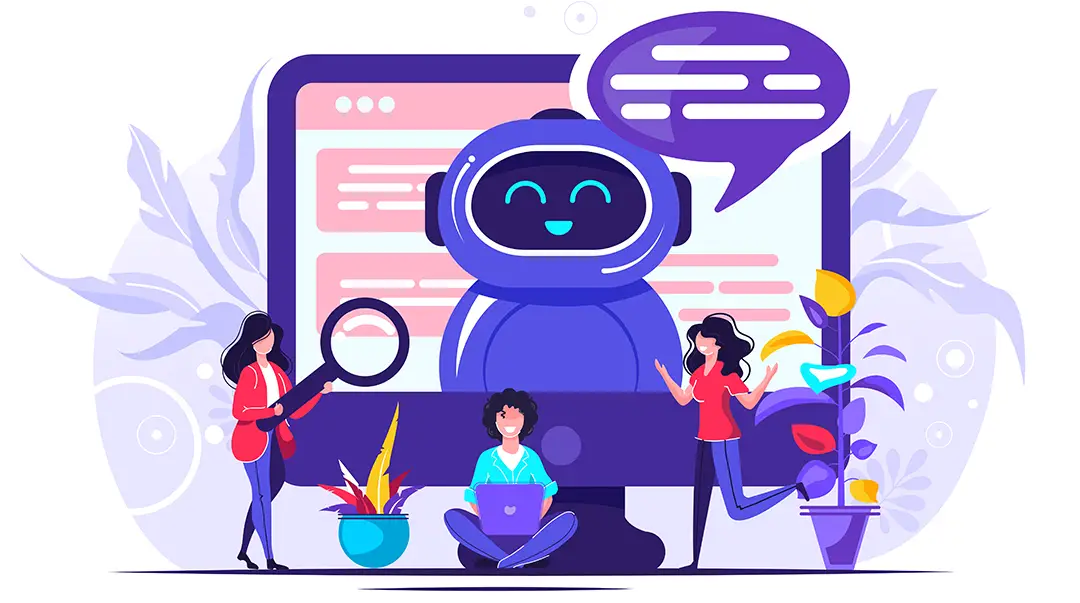Enhancing Customer Service with AI Chatbots: A Comprehensive Guide

In today’s fast-paced digital world, customers expect a seamless and efficient experience when interacting with businesses. Artificial Intelligence (AI) Chatbots have emerged as a powerful tool to enhance customer service and provide real-time support. These virtual assistants offer numerous benefits, such as improved response times, personalized assistance, and 24/7 availability.

Understanding AI Chatbots

AI Chatbots are computer programs designed to simulate human conversations through text or voice. They utilize Natural Language Processing (NLP) and Machine Learning (ML) algorithms to analyze customer queries, understand their intent, and generate appropriate responses. Unlike traditional chatbots with predefined responses, AI Chatbots can learn from each interaction, continually improving their communication skills and enhancing the customer experience.
Benefits of AI Chatbots for Customer Service
-
Improved Response Times: AI Chatbots can provide instantaneous responses to customer queries, eliminating the wait times associated with traditional channels like phone calls or emails. This immediate assistance enhances the customer experience, leading to higher satisfaction and engagement.
-
24/7 Availability: AI Chatbots are available 24 hours a day, 7 days a week, ensuring that customers can receive support whenever they need it. This round-the-clock availability is especially crucial for businesses operating across different time zones or catering to global audiences.
-
Personalized Assistance: AI Chatbots can analyze customer data, such as browsing history, purchase behavior, and past interactions, to tailor their responses and recommendations. This personalized approach enhances the customer experience by providing relevant information and assistance specific to their needs and preferences.
-
Streamlined Support: AI Chatbots can handle routine and repetitive tasks, freeing up human customer service representatives to focus on complex queries and high-value interactions. This division of labor improves overall operational efficiency and allows businesses to allocate resources effectively.
-
Cost Savings: AI Chatbots help businesses save costs associated with traditional customer service channels, such as staffing, infrastructure, and training. By automating routine tasks and reducing the need for extensive human intervention, businesses can optimize their expenses while maintaining high-quality customer service.
Best Practices for Implementing AI Chatbots
-
Clearly Define Objectives: Before deploying an AI chatbot, businesses should clearly define their objectives and desired outcomes. This could include improving response times, reducing customer effort, or increasing sales conversions. Having clear goals helps guide the chatbot’s development and ensures that it aligns with the overall customer service strategy.
-
Choose the Right Platform: Selecting the right chatbot platform is crucial for successful implementation. Businesses should consider factors such as ease of use, adaptability, scalability, and integration capabilities when choosing a platform. The platform should align with the business’s specific requirements and provide the necessary features to deliver exceptional customer service.
-
Train the AI Chatbot: Thorough training is essential to ensure the AI chatbot’s effectiveness. Businesses should provide the chatbot with a comprehensive knowledge base, including FAQs, product information, policies, and common customer queries. Additionally, they should monitor the chatbot’s performance, analyze customer feedback, and make necessary improvements over time.
-
Integrate with Existing Systems: To provide seamless customer experiences, AI chatbots should be integrated with existing systems, such as CRM, ERP, and knowledge management systems. This integration allows chatbots to access relevant customer data, provide personalized responses, and escalate queries to human agents when necessary.
-
Monitor and Evaluate Performance: Continuously monitoring and evaluating the performance of the AI chatbot is essential to ensure it meets customer expectations. Businesses should track metrics such as response time, resolution rate, customer satisfaction, and sales conversions. Regular performance analysis helps identify areas for improvement and make data-driven decisions to enhance the chatbot’s capabilities.
Conclusion
AI Chatbots are revolutionizing customer service by providing instant, personalized, and efficient support. By deploying AI chatbots strategically and following best practices, businesses can enhance the customer experience, boost operational efficiency, and drive business growth. As AI technologies continue to advance, AI Chatbots will play an increasingly pivotal role in shaping the future of customer engagement.## Enhancing Customer Service With AI Chatbots!
Executive Summary:
The integration of Artificial Intelligence (AI) in customer service has revolutionized the way businesses interact with their customers. One such innovation is the introduction of chatbots, which are computer programs designed to simulate human conversation through text or voice interactions. By effectively leveraging AI chatbots, companies can elevate their customer service capabilities, streamline operations, and deliver exceptional customer experiences.
Key Benefits of Implementing AI Chatbots for Superior Customer Service:
-
24/7 Availability:
- Chatbots operate round-the-clock, ensuring prompt responses to customer inquiries, regardless of time zones or holidays.
- This uninterrupted assistance enhances customer satisfaction and builds trust.
-
Immediate Response and Resolution:
- Chatbots provide instant responses to user queries, reducing wait times and improving the overall customer experience.
- They can efficiently resolve common issues without involving human agents, expediting the resolution process.
-
Personalized Interactions:
- Chatbots can personalize interactions by analyzing customer data and tailoring responses accordingly.
- This personalized approach enhances customer engagement and fosters positive relationships.
-
Seamless Integration:
- Chatbots can seamlessly integrate with existing customer support channels, such as websites, messaging apps, and social media platforms.
- This omnichannel approach provides customers with a consistent and convenient experience across multiple touchpoints.
-
Data Collection and Analysis:
- Chatbots collect valuable customer data during conversations, which can be analyzed to gain insights into customer preferences and behaviors.
- These insights can be leveraged to improve products, services, and overall customer experiences.
Conclusion:
AI chatbots have emerged as game-changers in the customer service landscape. By integrating chatbots into their operations, businesses can unlock a world of benefits, including improved customer satisfaction, increased efficiency, personalized interactions, seamless integration, and data-driven decision-making. With AI chatbots at the forefront of customer service, companies can unlock the power of technology to deliver exceptional customer experiences that drive business growth and success.
Keyword Phrase Tags:
- AI-powered Conversational Chatbots
- Customer Service Automation
- Personalized Customer Interaction
- Real-Time Query Resolution
- Data-driven CX Enhancement


That’s really cool! I can’t wait to see how this technology can improve customer service.
I’m not sure how I feel about this. I’m worried that chatbots will replace human customer service representatives.
This is a really interesting article. I’ve been following the development of AI chatbots for a while now, and I’m excited to see how they can be used to improve customer service. I think that chatbots have the potential to make customer service more efficient and effective, and I’m looking forward to seeing how they develop in the future.
I disagree with the author’s assertion that chatbots are always better than human customer service representatives. I think that chatbots have a lot of limitations, and that human customer service representatives are still the best option for many customers.
Oh, the irony! A chatbot writing an article about how chatbots are going to improve customer service.
Sure, let’s replace all human customer service representatives with chatbots. What could possibly go wrong?
I can’t wait until I can have a conversation with a chatbot that’s so realistic, I forget that I’m not talking to a real person. Then I can finally live out my dream of having a friend who never talks back.
I’m really excited about the potential of AI chatbots to improve customer service. I think that they have the potential to make customer service more efficient, effective, and convenient.
I’m concerned about the impact that AI chatbots will have on the job market. I’m worried that chatbots will replace human customer service representatives, and that this will lead to job losses.
I’m optimistic about the future of AI chatbots. I think that they have the potential to make the world a better place. I think that chatbots can be used to improve customer service, education, and healthcare.
I’m pessimistic about the future of AI chatbots. I think that they have the potential to be used for evil. I think that chatbots could be used to spread misinformation, propaganda, and hate speech.
I think that the future of AI chatbots is uncertain. I think that chatbots have the potential to be used for good and for evil. I think that it’s important to be aware of the potential risks and benefits of AI chatbots, and to use them wisely.